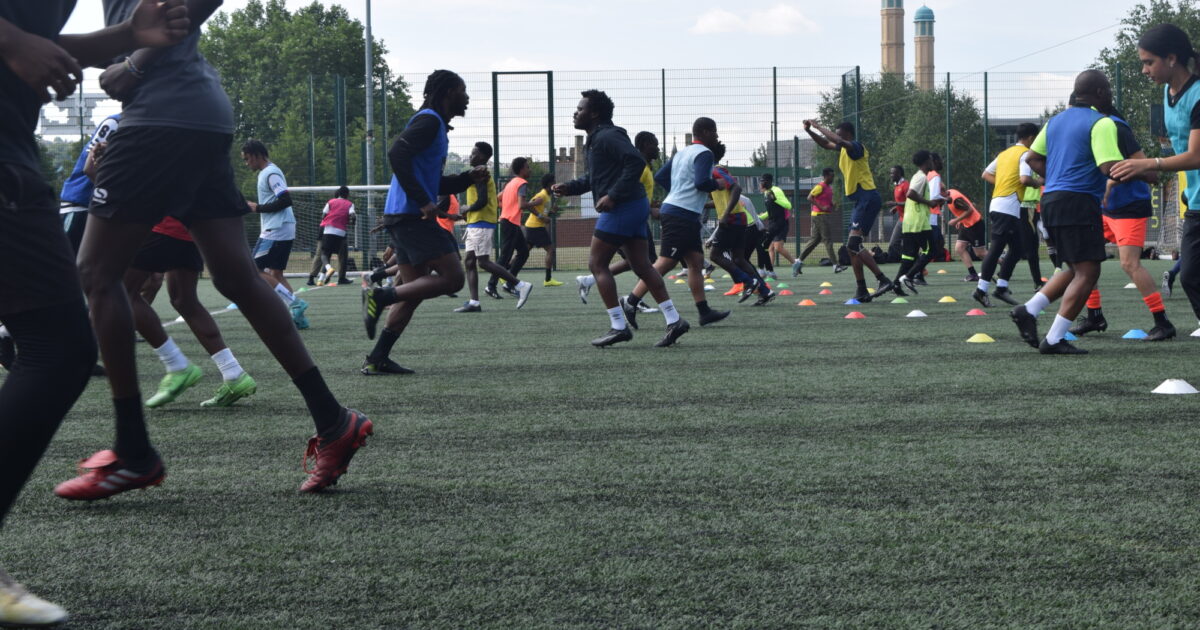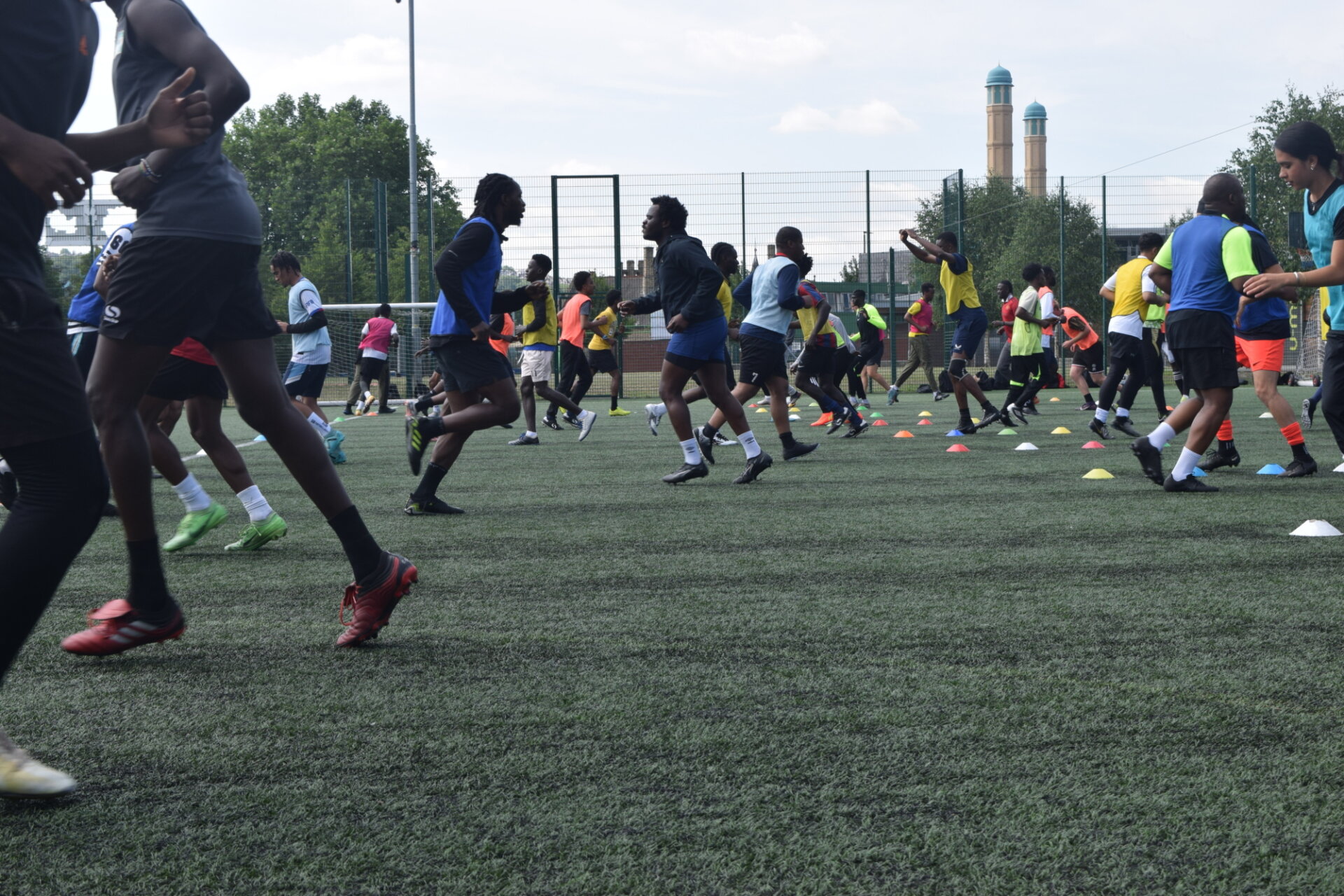
The Belonging Group training at the U-Mix Centre in Lowfield, Sheffield
James Cattell
I know this sounds funny, but you can’t really put into words what we do here. You just have to come down and experience it.
Lisa
Sultanti is reflecting on our hour-long conversation about her work at the U-Mix
Centre in Lowfield, Sheffield. Focused primarily on sport and fitness, the U-Mix
is far more than this: it’s a space full of movement, music,
creativity and education. It is a community centre that serves local people in ways that go beyond words.
Lisa
is the Engagements and Partnership Manager for a charity
called Football Unites Racism Divides (FURD), who manage and run
the U-Mix Centre. The previous week I observed her and colleague
Keith Ward showing a group of children from a local primary school
around the centre and introducing them to more than 60 refugees and people
seeking asylum who come to play football every week as part of an
initiative called The Belonging Group.
It’s clear that Keith and
Lisa are passionate about why they want local children to be educated on physical health and to have their minds
broadened by this exposure to diversity. What took me longer to fully
appreciate is that they just want people to experience
the feeling of solidarity and community that FURD has created – a feeling that has been lost to so much of
society,
slowly
eroded through years of austerity, hostile migration policies and the erasure of public services.
What
fascinates me is the role that football plays in how the centre
functions, drawing people into a space where everyone benefits. A
wide range of groups have been set up to offer different ways into a collective, one that crosses class, gender, generation and
ethnic lines. There are the intense sessions you would
expect from a place that produced one of the world’s best
footballers in Kyle Walker and there are regular games that you
would find on any pitch around the world. But FURD dedicates its real
energy to setting up free or minimal-charge spaces and activities for
everyone to find their game of football, and this emphasis on inclusivity
is at the heart of what they are about.
The Belonging Group for those seeking sanctuary is one example of
this dedication and collective energy in action. It was set up in
2014 as a weekly game of football for refugees and people seeking
asylum, but grew dramatically after the Covid-19 pandemic, when Keith teamed up with Sijo Joseph and headed out into
marginalised communities in Sheffield as part of an outreach
programme. 20 players soon became the 50-80 players now attending
each week. The demand meant what used to be a single game developed into three weekly
sessions, and the narrower aperture of football became a path into everything from wellbeing support, English classes and food to boxing and gym classes.
“The
Belonging Group is a safe place,” Keith tells me, “[a] safe
environment with a bit of structure that provides bits of education
and support. We offer the health, wellbeing, the football, little
bits of guidance and advice, mental health support and then we have
the partnerships that provide deeper expertise.”
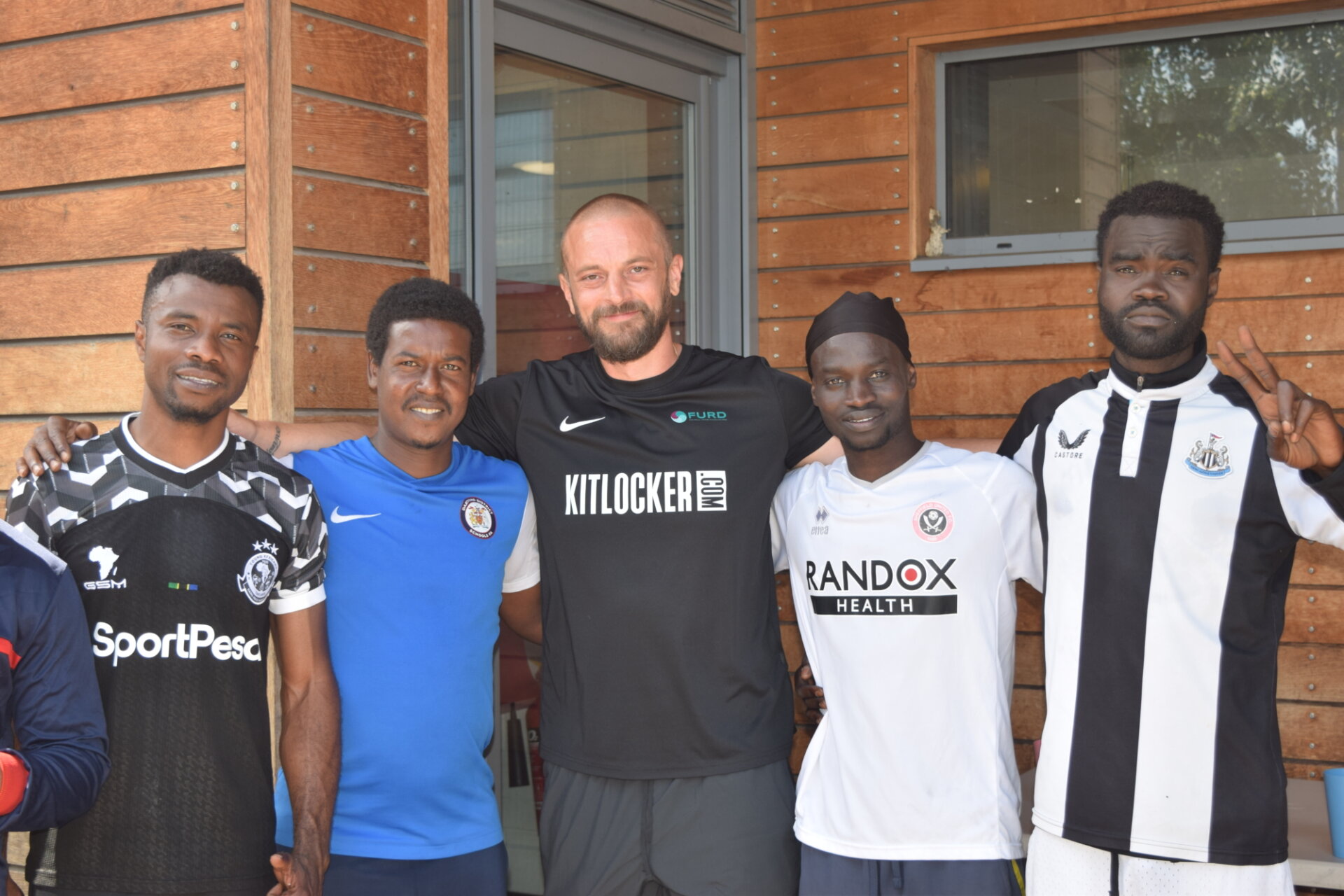
Hussein, Al Kasim, Keith, Mané and Isaak. Isaak comes on two buses from Rotherham every week to play. When I ask him if that’s difficult he says, “No, no, that’s easy.” He’s working to improve his English, attending weekly courses. He says he is desperate for work and it’s really difficult.
James Cattell
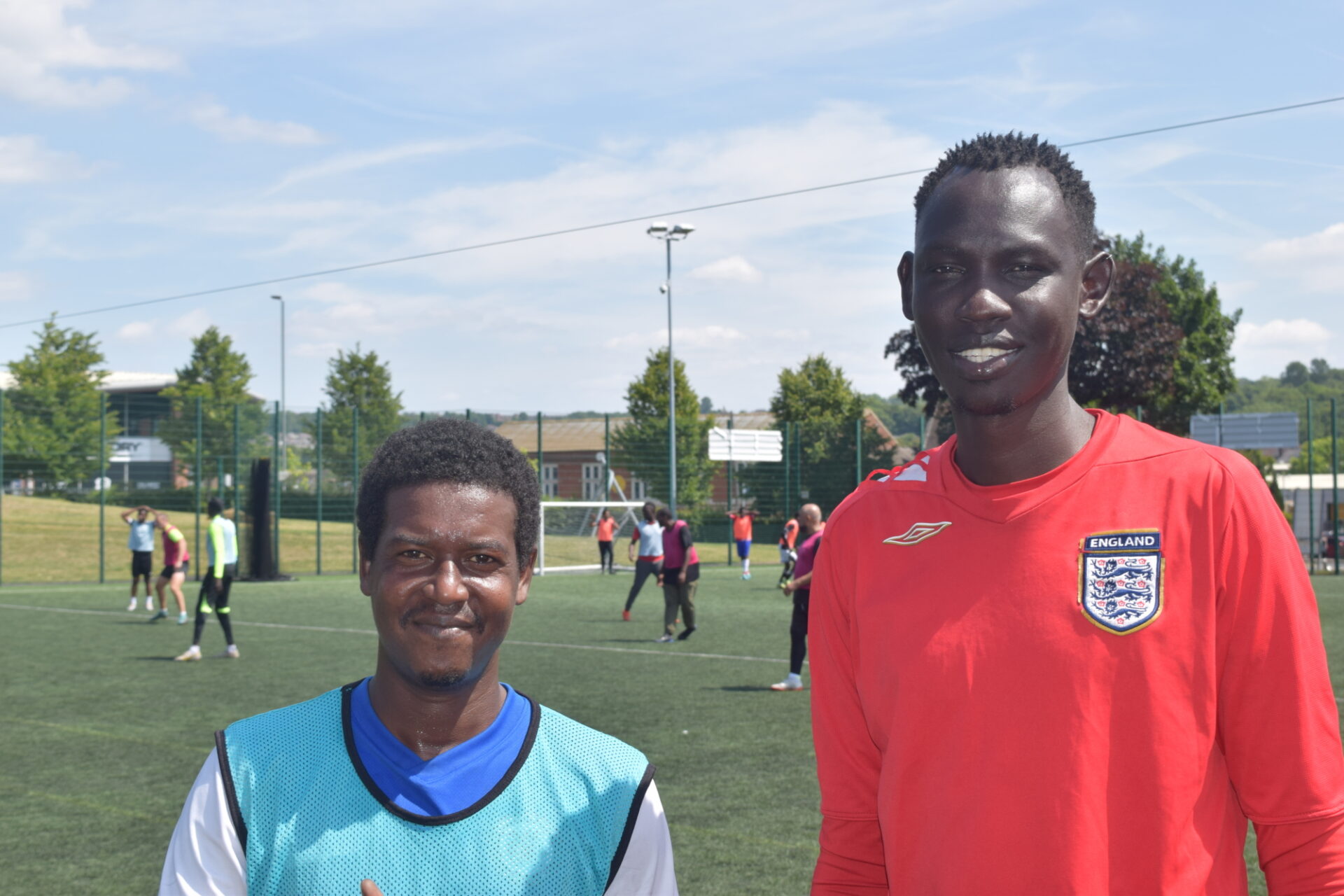
Zinc from Kenya came over with mum and brother in 2017. They were granted refugee status before coming to England. He was 19 at the time. He now works in ASOS packing centre four days a week. He did have a motorbike but it was stolen. He now has a car which gives him more flexibility.
Al Kasim from Sudan tells me how difficult it is to get work. He’s been here for three years but was only granted permission to work in January. He’s been at college two days a week studying English. He didn’t know any English before he came but now
speaks very well. He also speaks French. He did some work in a car wash as it’s the only paid work he has found.
James Cattell
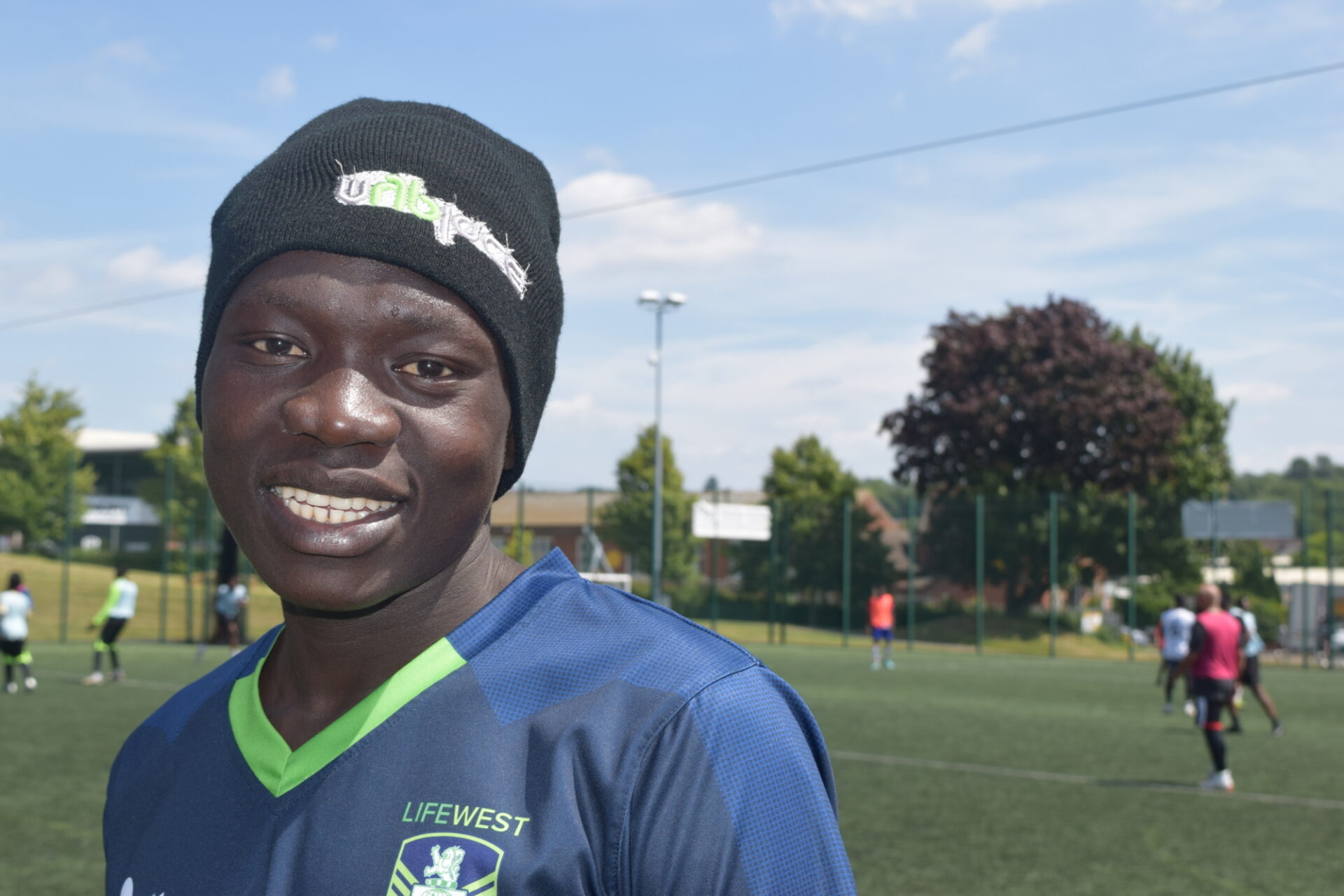
Sami from Sudan is 17 years old. Having arrived after an arduous journey and with no access to his birth certificate, he’s stuck in limbo waiting for the Home Office to move forward with his case.
James Cattell

Mo from Lebanon is an ex-professional footballer forced to leave Beirut. He was part of the group when it started in 2014.
James Cattell
Previous
Next
Keith is a sensei in its purist form and
the U-Mix Centre is more reflective of a dojo than Hillsborough or
Bramall Lane. It’s built on a shared love of football, but also with an
appreciation that football is a context for something bigger and far
more important. Keith grew up in the local area with his mum,
dad and three sisters. As an aspiring teenage footballer in Sheffield
United’s youth set up, his dad took him down to FURD to volunteer
and keep him away from local gangs. He’s now in his 40s and, with
a semi-professional career in football behind him, he connects a
lifetime’s experience in the game with his strong bond to the local
community. At 6 foot 5, Keith might appear as alpha male as they come,
but being
raised in a close-knit, loving family and having overcome a battle
against cancer in his 20s, he has developed a deep empathy and
compassion for people.
When I ask him how
someone so rooted in his local community was inspired to help set up
a group for people from all over the world, he recounts being ten years
old when four young lads were brought into his Sharrow Primary School
classroom. “They were brothers from Somalia. They spoke very little
English and it was my first experience of having a friend from
Africa. The trauma they’d faced was nothing I’d seen or heard of
before. They’d seen parents shot dead. They had to leave their
country because of war.”
Trauma from
displacement is a reality for so many migrants fleeing lives crippled
by wars, climate breakdown and violent persecution. Added to this is the
impact of perilous journeys across land and
sea to find sanctuary and safety. On arrival in the UK, many become
trapped in
the limbo created by the UK’s hostile environment, with a
migration system entrenched in racist colonial logics that position
the lives of some humans as worth more than others. Isolated in hotel
rooms or temporary accommodation, waiting
years for a Home Office decision
and banned from working, these people’s daily lives are intentionally
made more miserable in the name of acting as a
deterrent.
This absence of state support means that communities like the Belonging
Group are a lifeline to people who are part of our society – whether
some people and politicians like it or not.
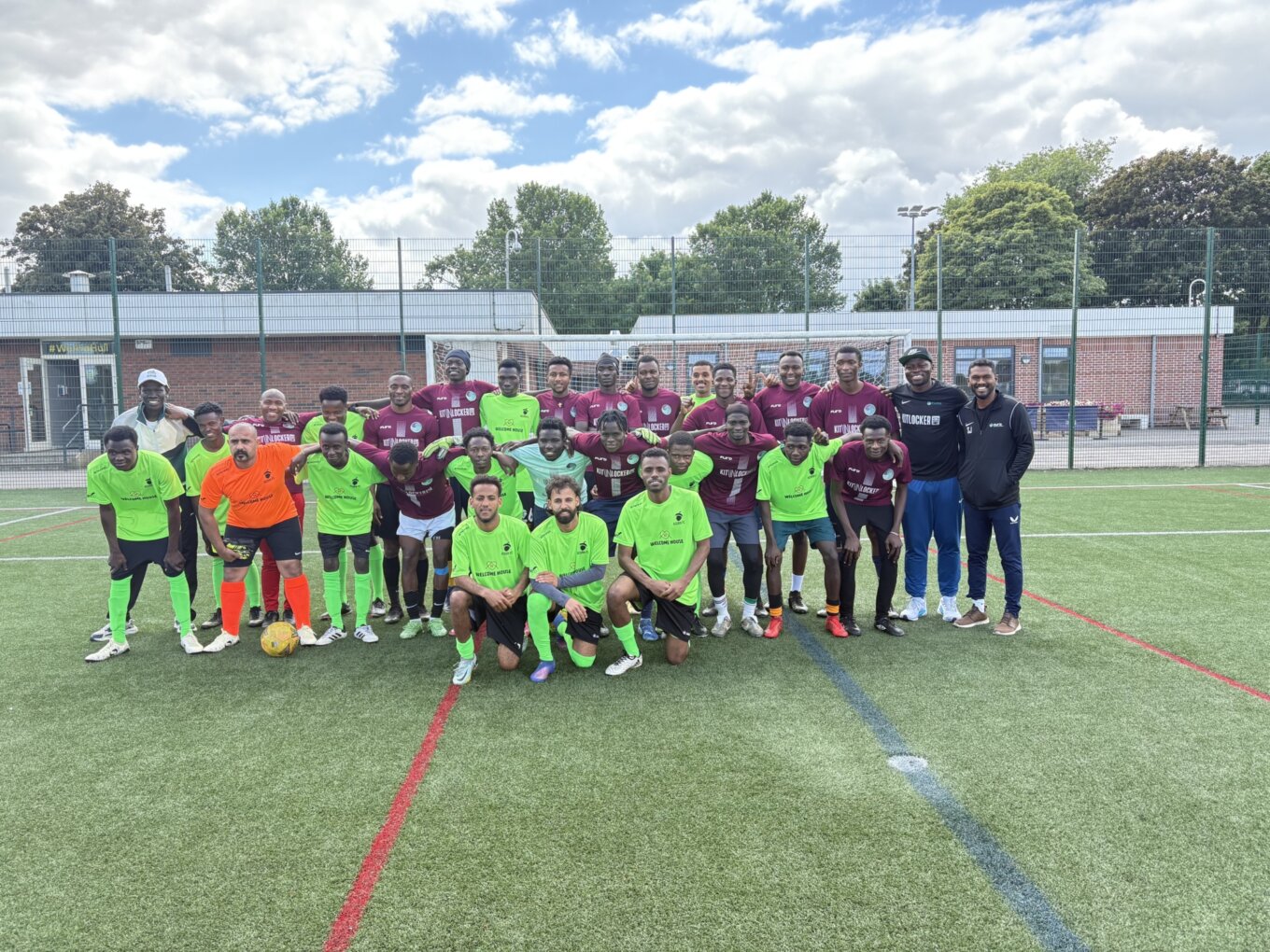
A Belonging Group team who recently travelled to Hull for their first competitive fixture.
Sijo Joseph
“The idea of the Belonging Group was to
provide the best training experience that someone could have,” Keith tells me. “Not
just making them work hard on the pitch, but teaching them how to
coach, teaching them how to exercise. Because there’s an
understanding that we may just have these people for two hours a week
and they have the rest of the week to survive, to keep busy, to keep
moving. That’s where the education side came into it too – equipping
people with the ability to go back to their own room and exercise in
a safe and structured manner, because exercise is how I survived my
experience as a cancer patient.”
On Mondays and
Wednesdays people greet each other with smiles, handshakes, hugs and
respect. They are divided into competing teams at random to
encourage players to mix and make new connections. As well as
furnishing a network of support, education in English language and
social norms, the group’s aim is to hand over responsibility to its
members, as something that is key to their personal development and
emotional resilience.
A prime example of this is Isaiah. A
33-year-old man from Nigeria, Isaiah joined the group when he arrived in Sheffield five years ago. After
a year he was invited to become an assistant coach and FURD
sponsored him through his FA
Level 1 and 2 courses. He now works alongside Keith to run the
Belonging Group. He explains proudly: “I’m here 3-4 times a week.
Monday, Wednesday and Friday. Sometimes on Tuesday or Thursday, with
coaching the kids when my own childcare and job as a healthcare
assistant allow. I call this place my second home. Whenever I come I
feel happy. You can see the energy in me. Supporting people,
encouraging. It keeps me going. It gives me joy in myself.”
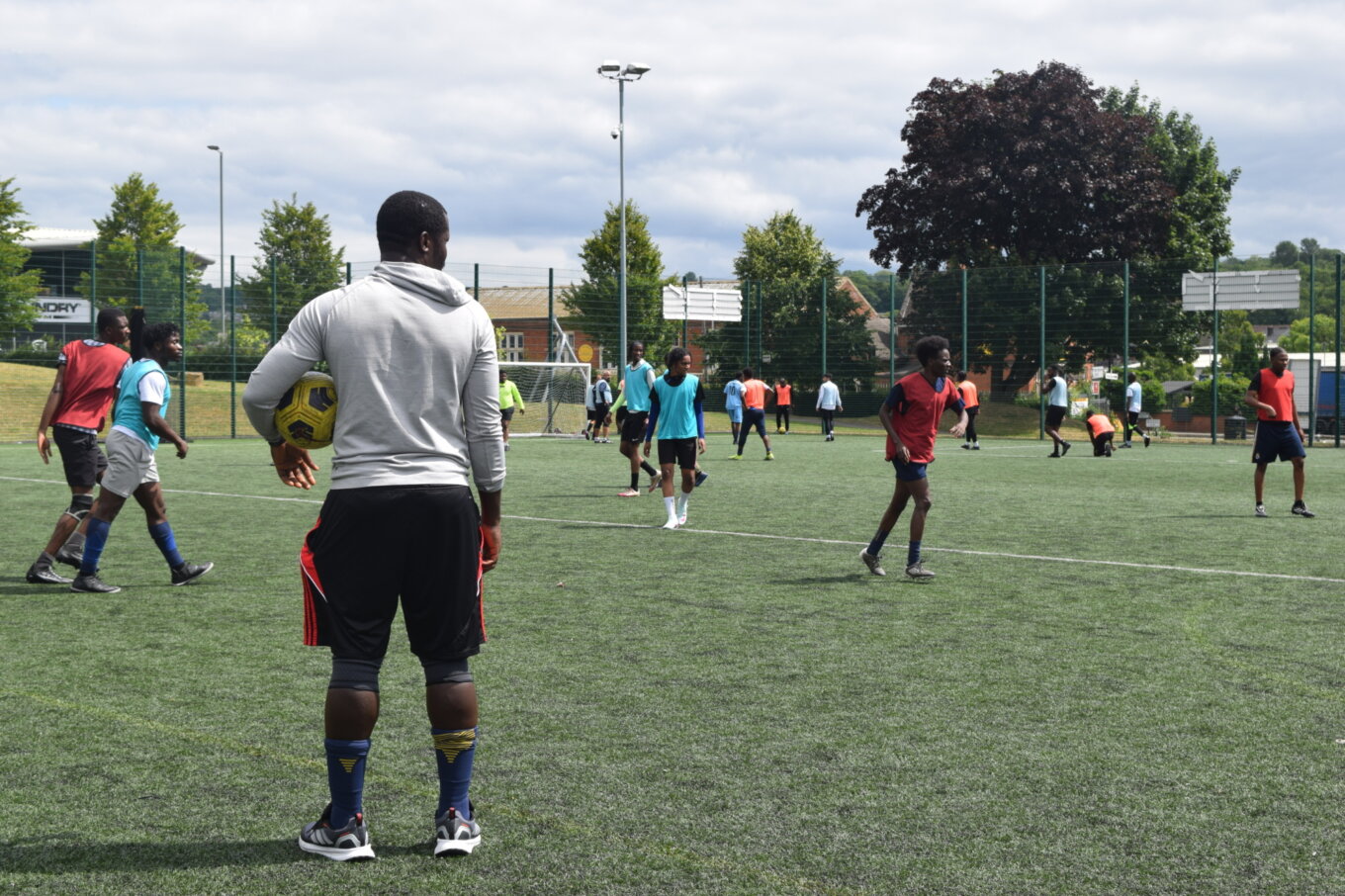
Isaiah at the U-Mix Centre
James Cattell
But the success of the
group hasn’t come easily. “Big
numbers intimidate and people didn’t like it,” says Keith, “So
it’s taken a lot of work by staff and volunteers to make sure it’s
a safe environment, to make sure the negativity that surrounds
football, the aggressive side, the angry side, the confrontational
side of it is all eliminated whenever someone comes here to play.”
Isaiah plays a pivotal role
in how this group of more than 60 strong, athletic men dealing with
issues of trauma, anxiety and low self-esteem can function within a
‘safe space’. He takes on responsibility as timekeeper and
tackles problems head on when they arise. One volunteer coach
explains: “It’s
very important that the whole group see there’s a reaction […] and
it’s not ignored, and that reaction is controlled and clear.
It’s how people feel safe, because they know everything is being
supervised and things are being managed. Football is football. There
will be occasions when people go head to head. We just need to
remember it’s not life or death, and we’re here to enjoy.”
This
authenticity is key. Games aren’t paired down; they aren’t
treated differently to other games. Participants find a space where they
can be themselves, show their
ability and feel valued as part of a team. This confirmation of an
identity liberates them from definition as an other: a refugee
or an asylum seeker, defined through the narrow lenses of victim or
perpetrator, through their crossing of borders. They can express and
enjoy themselves in ways that are
nearly impossible in so many areas of their daily life.
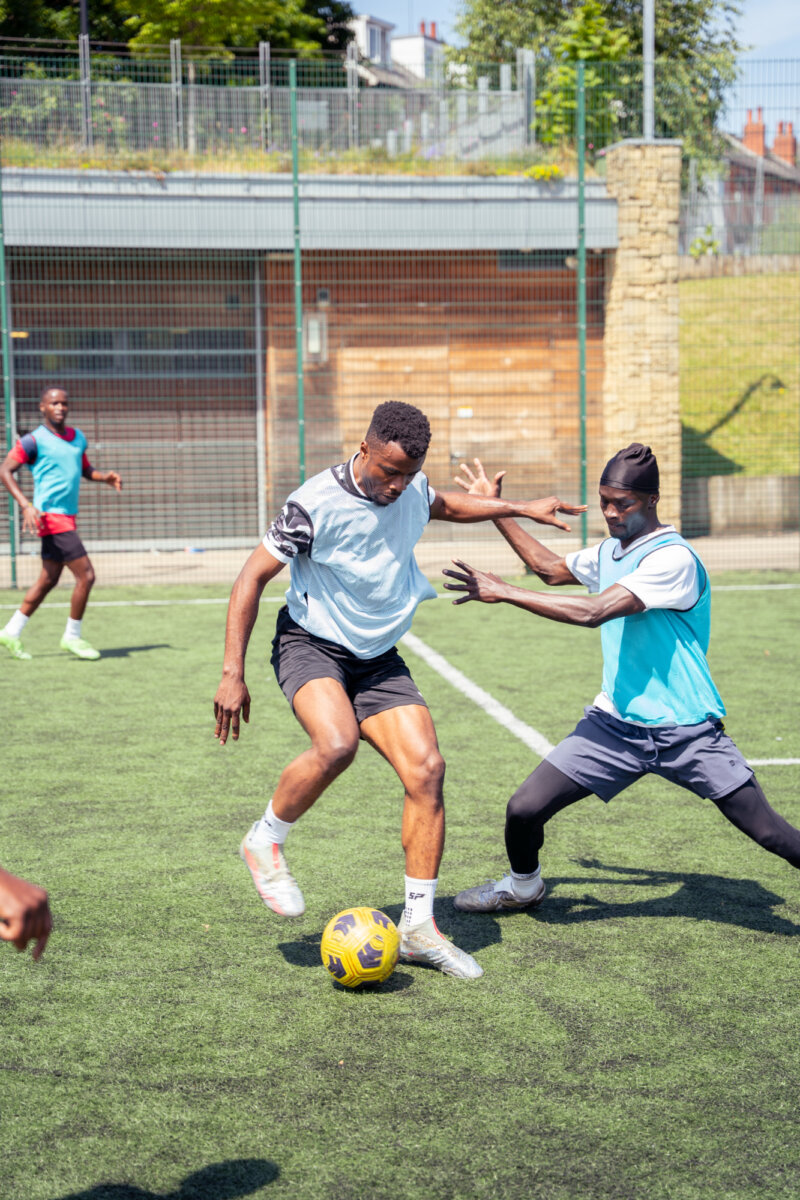
Mané and Hussein from the Belonging Group
David Galandou
The
group builds social connectedness, emotional resilience and physical
health for the participants and, as people
come together in an activity that brings joy, they gain confidence
and proof that a sense
of shared responsibility and mutual support really can still exist. “We
see the difference it makes,” says one of the coaches. “Being
there at tough times, like last year with the riots in Rotherham, in
which many of our members were affected because they lived in the
hotel that was attacked.”
A
recent development over the last 18 months is the inclusion of a
small number of locals into the group. This wider community programme
ripples
out beyond the initial group to connect with and support other
marginalised and disenfranchised people.
Since inclusion
is a driving force behind FURD’s work, restricting the group to
solely refugees and asylum seekers runs counter to their
instincts. How this is managed going forward will be a challenge, but
all evidence suggests that the FURD team are up to the task.
“I love football,” says Keith. “I
love football,” says Isaiah. “I love football,” says Sami from
Sudan. “I love football,” says Zinc from Kenya. “I love
football,” says Mo from Lebanon. “I love the power of football,” says
Lisa – who may have avoided the bug but is now fully engaged due to her
teenage son’s passion for the game.
That power is linking refugees
from Sudan with local Sheffield
men on parole. This is what football can be about. But it’s not
just about football. FURD
and its collaborative work at the U-Mix Centre offer
an alternative to the hostile environment and racial capitalism. This
is radical
care in action,
offering a glimpse of how British society could be otherwise, with
clear boundaries, kindness and support to help people through periods
of limbo and transition – a glimpse of a different kind of world-making that can really make
change.
